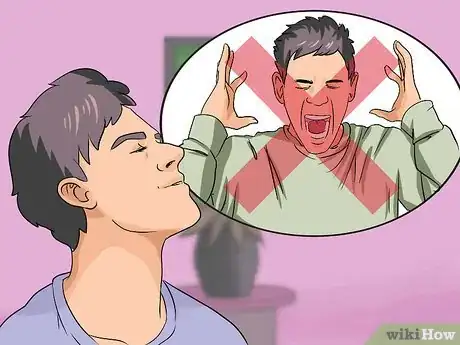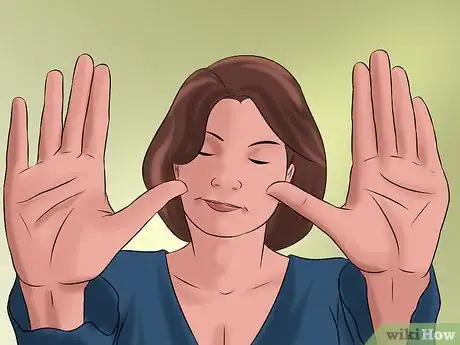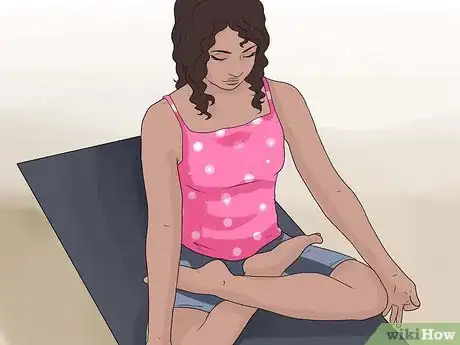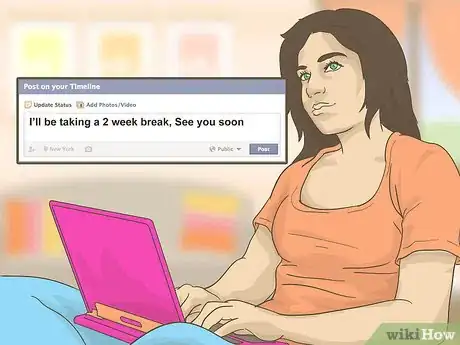This article was co-authored by Jennifer Guttman, PsyD. Dr. Jennifer Guttman, is a Cognitive Behavioral Therapist, Clinical Psychologist, and the Founder of the Sustainable Life Satisfaction®, a motivational and lifestyle platform. With over 30 years of experience and practice in New York City and Westport, Dr. Guttman specializes in treating people struggling with acute behavioral disorders stemming from anxiety, depression, stress, attention deficit, and phobias. She holds a Bachelor’s degree in Psychology from Drew University and a Doctor of Psychology from Long Island University. Dr. Guttman is the author of "A Path To Life Satisfaction Workbook (2018),” a monthly blog contributor to Psychology Today and Thrive Global, and a contributor to articles in major publications, media sites, and podcasts including The Washington Post, Reader's Digest, Redbook, Teen Vogue, Health, mindbodygreen.com, Harvesting Happiness, and Unshakable Self-Confidence.
This article has been viewed 1,692 times.
We live in the self and part of what makes up the self is our body. Our body is a living, breathing home that houses the thoughts and feelings that make us who we are as individuals. Now, sometimes as individuals, we find it almost unbearable to live with ourselves and all that comes with it but it does not have to be that way forever and that is why this wikiHow is here for you today. Outlined below are a few fundamental steps on how you can live with yourself. Enjoy!
Steps
Making Peace with Yourself
-
1Forgive yourself. Forgiving yourself for all you have done and all you have failed to do is key to living with yourself. There is no use crying over the past — It is long gone. All there is, is the now, and what you can do in the now is:
- Acknowledge your mistakes. Put aside your pride and accept your mistake.
- Disconnect your mistakes from your identity. You are not your mistakes. You are more than that. You are deserving of love and forgiveness no matter the situation.
- Free yourself of guilt. Instead of feeling guilty, work towards making yourself a better person so as to not repeat your mistake again.
- Use your mistakes as building blocks for your life. Ever heard of the quote — Never a failure — Always a lesson? Your mistakes should be a stepping stone for the future.
-
2Be yourself. Being yourself means staying true to who you are and who you want to be as a person. Failure to results in losing sight of your morals and beliefs, passions and ambitions, likes and dislikes, and all the characteristics that set you apart from the rest! In order to be yourself you need to:
- Stand up for yourself and what you believe in. Inner conflict begins when we toss our needs and belief aside and adopt those of others even if we do not believe them to be true or right. However, this should not be the case. We should be able to speak up and speak out when we do not like something or think it is not right.
Advertisement -
3Stop comparing yourself to others. We often compare ourselves to other people even if we do not know them in real life. That in turn results in hatred of ourselves and others. It should not be like that. We should be able to love ourselves no matter how bad our life seems to be. We can never know. Perhaps the people we are comparing ourselves to have even bigger problems than us. After all what we see on social media and even in real life could just be a front. So, here are a few tips on how you can stop comparing yourself to others:
- Embrace how unique you are. There is not one person on earth who is the same as someone else. We differ in looks, personalities and so much more. So, instead of being jealous or hating on someone, embrace how unique you are and work with it which brings us down to the next point.
- Work with what you have. You can be as pretty as the people you compare yourself to if you work with what you have. Say, for example, you have a big forehead, and the person you compare yourself to does not and that makes them seem prettier in your eyes. Instead of beating yourself about it and finding different ways to shrink your forehead, work with it. Tie your hair up as opposed to tying it back so that your forehead does not seem too prominent. If you do not feel confident still, cover it up with bangs but remember, you cannot hide under those bangs forever.
-
4Seek professional help. A professional such as a therapist may be what you need to help you better understand why you fail to live with yourself — be it because of guilt or past mistakes. A therapist will help you explore the ‘w’ questions; When did I start failing to live with myself? Why do I fail to live with myself? What can I do about it? And so on! Please note that:
- If you cannot afford a therapist — schools, hospitals, churches, and sometimes workplaces offer counselors for free.
- If you do not feel comfortable with your therapist or counselor, feel free to request for a different one.
- If you do not feel comfortable having a therapist in the same country as you for fear of being judged, there are online apps such as better help that will match you with a therapist based on your needs.
Loving Yourself
-
1Be kind to yourself. When we are down, we tend to beat ourselves up about things but that should not be the case. We should be kind to ourselves and treat ourselves the way we would treat someone we love. You are someone too. Someone who deserves to be treated with love and kindness. Here are a few tips on how you can treat yourself better:
- Listen to subliminal messages. Subliminal messages are signals — be they visual or audio — that are designed to penetrate the subconscious mind. Scientists have estimated that the subconscious mind controls 95 percent of our lives. With that in mind we can deduce that if we listen to positive subliminal messages in our lives, our self-image and self-esteem will be boosted. Already made subliminal messages can be found on YouTube but it is best to make your own so as to be safe from malicious subliminal messages meant to harm others. The best time to listen to subliminal messages is in the morning and at night as your brain is more susceptible to them.
- Listen to positive affirmations and repeat them to yourself. Affirmations are statements that affirm that something is true or exists. These affirmations are made to reach out to our conscious mind and change our narrative of what we believe to be true about ourselves. Say for example you believe that you are not deserving of love. You can listen to affirmations that tell you that you are worthy and deserving of love and repeat them to yourself.
- Tangibly reinforce a job well done—don't wait for the outside world to reinforce your successes. You are the best judge of your performance so you should take charge of reinforcing yourself.
-
2Practice gratitude and acceptance. Often than not, we perceive that other people have it better than us but that might not be the case. It is important to be grateful for even the air that we breathe every day and for the people all around us because some people do not have that and if we happen to be the ones who do not have that, it is equally as important to be accepting of our situation. A few ways to practice gratitude include:
- Thinking of three or more things you are grateful for each day. We often take the things we have for granted because we think that we will have them forever but nothing is permanent and things are bound to change in one way or the other. So, with that in mind, take a few minutes each day to look around and appreciate everything you have before it is taken away from you.
-
3Set boundaries. Setting boundaries means being able to draw the line before someone evades your personal space and privacy. It also means saying no to situations that do not benefit you or pose a threat to you. If you do not set boundaries, people will trample all over you and you don’t want that. Why? Because it can prove impossible to live with yourself like that. With all this in mind, it is important to learn the phrases:
- No.
- That's not going to work for me.
- I'm not obligated to explain myself to you.
- I know you think that’s “just a joke,” but it’s not funny.
-
4Spoil yourself. Spoiling yourself is giving yourself things you normally would not have and doing things you normally would not! Here are a few tips on how to spoil yourself:
- Eat out. Eating out once in a while can relieve you of the stress of coming back home after a long day and having to cook. This in turn can make you feel a little better in times when you feel like being human is too much to handle.
- Get your hair done. Changing your hairstyle or simply getting a haircut can not only make you feel good about yourself but also give you a restart. It is almost as if your problems and worries go away with the old.
- Take a mini-vacation from work and studies. Sometimes all you need is to take a break! Need I say more?
Spending Time with Yourself
-
1Meditate. Meditation is medication for the wandering mind. When practiced, it helps you pay attention to the present moment with an accepting, non-judgemental disposition. This can be of great help in your journey of trying to live with yourself. When overcome with emotion, breathe and focus on the present and how you will never have it again.
-
2Journal. Journaling is a self-expression that can help you not only explore your thoughts and feelings but also put them in perspective. It can also act as a reflection of how far you have come in times when you feel stuck in the same area of your life or simply feel behind in life. Some good journaling tips include:
- Try writing daily self-affirmations—these are statements you make about yourself that demonstrate pride in your abilities or actions. Use these affirmations to balance your view of yourself and to help you build evidence of your successes (and, in turn, build confidence).
- Letting go of judgments. Remember that you’re the only one who’s going to see what’s written in your journal. So, it is okay to write down anything (even the most embarrassing of things), it’s okay to write messily and it’s okay to not make any sense whatsoever. After all, it is your journal.
- Journal about anything that comes to mind. If you think about something that happened years ago while writing in your journal, it is absolutely fine to write it down. You do not have to be chronological in your writing. You can go from writing about the pandemic in 2022 to writing about a television show.
-
3Social media detox. Social media can paint a picture that everyone is living their best life when that might not even be the case and this can do more harm than good to your mental health. In order to prevent yourself from spiraling into a pit of sadness, you need a social media detox. A social media detox means staying away from all social media platforms for as long as you deem necessary. Now, staying away from social media can prove difficult but here are a few ways on how you can ease that difficulty:
- Inform your family and friends. You do not want to worry your loved ones about a sudden disappearance. And in light of that, you should tell them that you plan to stay off social media for a few days. In that way, they can help you too! And if they so badly need you, they can call!
- Put your phone on do not disturb. Now you’re probably thinking, “What if an emergency happens and no one can reach me?” Relax. The world does not revolve around you and will function with or without you. Whatever urgent business you have can wait and if it is so urgent someone will make an effort to come to your home. Aside from that, it is important to put yourself first! You are someone too!
-
4Date yourself. What better way to know, learn and love to live with yourself than to take yourself out on a date! Now, I know what you’re thinking, “Won’t people think I’m a lonely weirdo with no friends?” Well, perhaps, but this is the first step to not caring about what other people think and to start living for yourself and less for others. Self-acceptance, self-growth, and courage begin here!
Caring for yourself
-
1Care for your body inside and out. Being comfortable and confident in your own skin begins with cleaning your body every day. In order to do so, the following hygienic practices must be observed:
- Bath every day. To keep your skin clean, fresh and bacteria free for the most part, you are required to wash yourself with soap and water daily — particularly focusing on areas such as the armpits and private part. Failure to the aforementioned can result in the build-up of dead skin cells, dirt and sweat on the skin. This, in turn, triggers acne, bad bodily odour and if you suffer from a condition such as eczema, poor hygiene can worsen it.
- Use deodorant or antiperspirant. Sometimes bathing is not enough to keep yourself from smelling like sweat throughout the day and that is why deodorant and antiperspirant are there to keep you fresh and dry. If you, however, suffer from a condition such as hyperhidrosis — which is characterised by excessive sweating — you might want to use a product which combines deodorant and antiperspirant or check in with your dermatologist to see what works best for you. Home remedies such as Lemon and baking soda work too since they dry your skin and thereby control sweat.
- Brush your teeth. Brushing your teeth is important to keep your breath smelling fresh, your teeth looking white and to prevent dental problems such as cavities. Care must be taken when purchasing toothpaste to ensure that it is providing you with all the things your teeth need to be healthy.
- Use the toilet often. You should neither keep urine nor poop in your system for too long as they are waste products meant to be flushed out. Also keep in mind that holding your urine regularly can weaken your bladder. Holding your poop on the other hand, can result in constipation.
-
2Care for your hair. When it comes to keeping your hair clean, it is important to wash it depending on how oily or dry your hair tends to get. If your hair gets oily fast, wash it every day to avoid product build up as well as keep both your hair and scalp clean. If, however your hair is on the dryer side, wash it once a week or whenever you deem fit since dryer hair is more prone to breakage. A few tips to keep in mind as you care for your hair are:
- Learn your hair type to best handle your hair. In simpler terms, type 1 hair is straight, type 2 is wavy, type 3 hair is curly and type 4 is coily. It is also important to note that different parts of your head may have different curl patterns. Use the aforementioned to learn what best suits your hair!
- Use products that suit your hair type. Nowadays, products are made to suit your hair type. Say for example you have type 4 hair — products made for such coily hair will ensure that they include ingredients that make your hair softer and far much easier to detangle.
- Concentrate shampoo on your scalp and conditioner on your hair. Shampoo can be very drying for your hair because it is made to mostly clean your scalp. Conditioner on the other hand, is made for your hair and should be applied on the hair; not the scalp. It is also important to avoid products with sulphate and paraben as these can strip the hair and scalp of natural oils as well as irritate the scalp.
- Moisturize your hair. To keep your hair soft and tangle free, moisturise it with butters such as shea butter and oils such as coconut oil. Additionally, when choosing which butters to use, consider how thick or thin your individual hair strands are because some butters and even oils may be too heavy on your hair.
- Keep your hair in protective styles. Protective styles such as braids and buns protect your hair from the sun, wind and other elements of the environment. They also prevent you from handling your hair too much as this can lead to breakage of hair.
-
3Care for your clothes. When someone looks at you, the first thing they see are your clothes and they make an assumption based on that. Obviously, you want their assumption of you to be good, so keep your clothes clean by washing them as well as ironing them. Furthermore, care must be taken to avoid staining your clothes with grease and dirt. Here are a few more tips on how to keep your clothes clean:
- Women and girls, change your sanitary pads or tampons often. If your flow is heavy, you might want to change your pad every 3 to 4 hours to avoid staining your clothes.
- Buy none-staining deodorant. Some deodorants leave white stains behind. To keep your clothes looking good in the armpits, buy none-staining deodorant.
- Pay attention to care labels on clothes. Care labels provide you with information on what kind of fabric you are dealing with, how much heat to use on the fabric and so on.
-
4Care for your health. In order to keep your body in tiptop shape, it is important to take about 15.5 cups (3.7 litres) of fluids a day for men and about 11.5 cups (2.7 litres) of fluids a day for women. It is also crucial to maintain a balanced diet, exercise regularly and sleep for at least 8 hours a day. Please note that:
- If you have a medical condition, see your doctor regularly.
- Educate yourself on the symptoms of a heart attack.
- Quit smoking and drinking alcohol in excess.
- If you are a drug addict or suspect that you are addicted to drugs, see a doctor and go to rehab.
Community Q&A
-
QuestionWhat would I do if I have friend issues at school and am required to go to school (by law)?
 EvelynCommunity AnswerFor starters, you could try to fix your friend issues. If your friend issue is that you and your friend are fighting, try to talk to them about how that makes you feel and resolve it. In the case that you fail to resolve it, cut that friend off and find new friends if you so please. If your friend issue is that you do not have any friends, socialize. And remember that you go to school to learn and as such, that should be your main focus and you should never miss or drop out of school because of friend issues. After all, your friends neither run the school nor your life. If these friend issues get to the point where they are too much for you, talk to a trust adult. Don't suffer in silence.
EvelynCommunity AnswerFor starters, you could try to fix your friend issues. If your friend issue is that you and your friend are fighting, try to talk to them about how that makes you feel and resolve it. In the case that you fail to resolve it, cut that friend off and find new friends if you so please. If your friend issue is that you do not have any friends, socialize. And remember that you go to school to learn and as such, that should be your main focus and you should never miss or drop out of school because of friend issues. After all, your friends neither run the school nor your life. If these friend issues get to the point where they are too much for you, talk to a trust adult. Don't suffer in silence.
Warnings
- If you find yourself having suicidal thoughts see a therapist immediately or talk to someone you are close to; be it a family member or friend.⧼thumbs_response⧽
References
- https://lifehacker.com/use-these-boundary-phrases-during-uncomfortable-convers-1849657838
- https://www.healthline.com/health/sense-of-self
- https://www.healthline.com/health/how-to-forgive-yourself
- https://www.mayoclinic.org/healthy-lifestyle/nutrition-and-healthy-eating/in-depth/water/art-20044256#:~:text=The%20U.S.%20National%20Academies%20of,fluids%20a%20day%20for%20women











































































